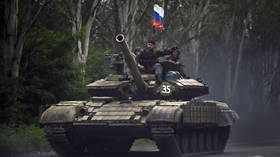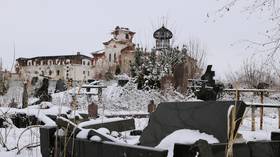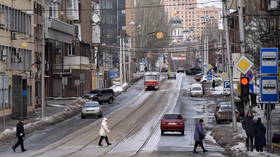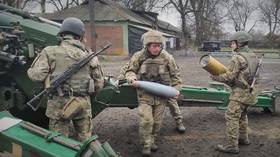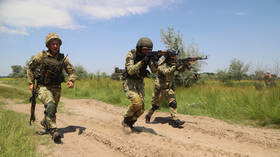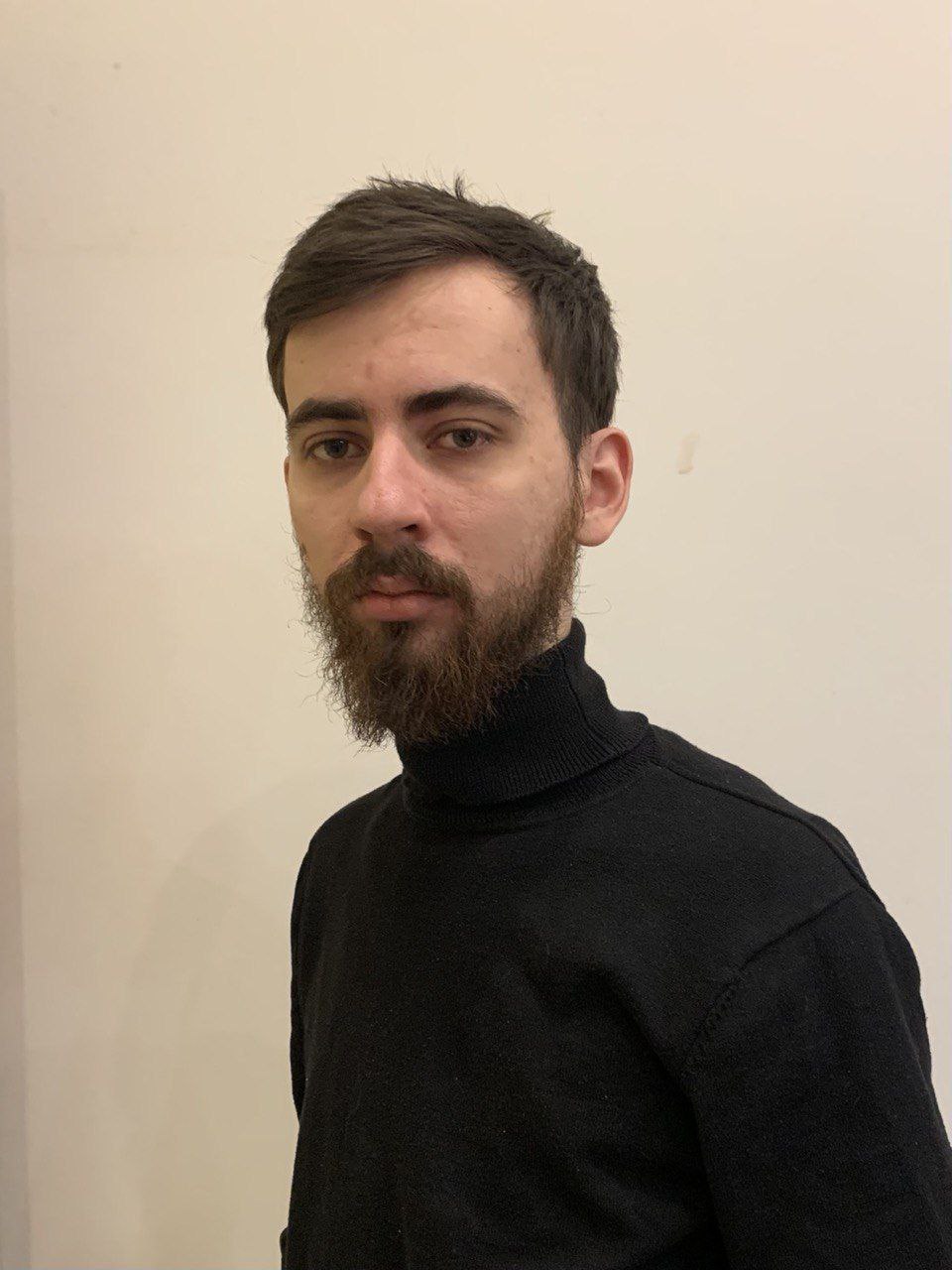‘Without Russia, we won't stop a full-on Ukrainian offensive’: What people in Donbass say about the ongoing military crisis
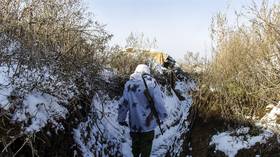
The war in Ukraine has been going on for eight years. Recently, tensions began heating up, with multiple Western countries expecting an imminent ‘Russian invasion’ of its neighbor. Moscow strongly denies these rumors, instead pointing the finger at Ukraine and Kiev’s increased eagerness to take back its ‘rogue regions’ by force, exacerbated by the West’s shipments of arms and ammunition. RT asked Donetsk-based journalist Vladislav Ugolniy to describe what life is like in the city many expect a relapse into a full-scale war, and what residents think of Russia, Ukraine, and the never-ceasing drumbeat of war.
The “invasion” will happen after the so-called rasputitsa, the season when roads become extremely muddy and make it difficult for military vehicles and hardware to move around. Since 2015, the armed volunteers in the Donbass have apparently waited for the mud to dry up every spring or freeze solid in the fall. The myth that thousands of people had bought into became a funny meme about the frozen state of the geopolitical hostages – the breakaway republics in eastern Ukraine.
Seven years ago, the Minsk II agreement put the Donbass self-determination issue on hold. The political settlement was supposed to stop the armed conflict and create a framework under which the pro-Russian and pro-American systems could co-exist within one state, while also guaranteeing Ukraine’s neutrality. The diplomatic efforts, however, failed to stop the violence; the diplomacy just localized the war along the front line, with millions of people living on each side of it.
While global leaders were confirming their commitment to the political settlement, saying there was no alternative, the people involved in the Donbass war knew that at some point shooting would start again. Everyone – the combatants themselves, as well as journalists, volunteers, doctors, priests, and activists – believed this would eventually happen. They believed and prepared. This might be the only thing the Donetsk People’s Republic (DPR) supporters and Ukrainian patriots have in common: they all know that a new wave of hostility is coming and the notorious “invasion” is inevitable.
This winter, the international media adopted the language of the Donbass armed volunteers, talking about the “Russian Rasputitsa” as the main factor that will determine the apocalyptic “Russian invasion” aimed at destroying Ukraine’s statehood and NATO’s unity. There’ve been rumors that frozen mud was something Joe Biden discussed with the Ukrainian president. If this is true, we can assume that the White House and globalist media have demonstrated an unprecedented level of expertise – they now get their intel from anecdotes that the Donbass fighters came up with seven years ago.
We are in Donetsk, the capital of the Donetsk People’s Republic, and it’s plus 2° Celsius outside. People walk around in slowly melting snow, turning it into mush. We are here on a fact-finding mission, in case the State Department analysts will need to add a grain of truth to their massive volumes of lies in ten years or so.
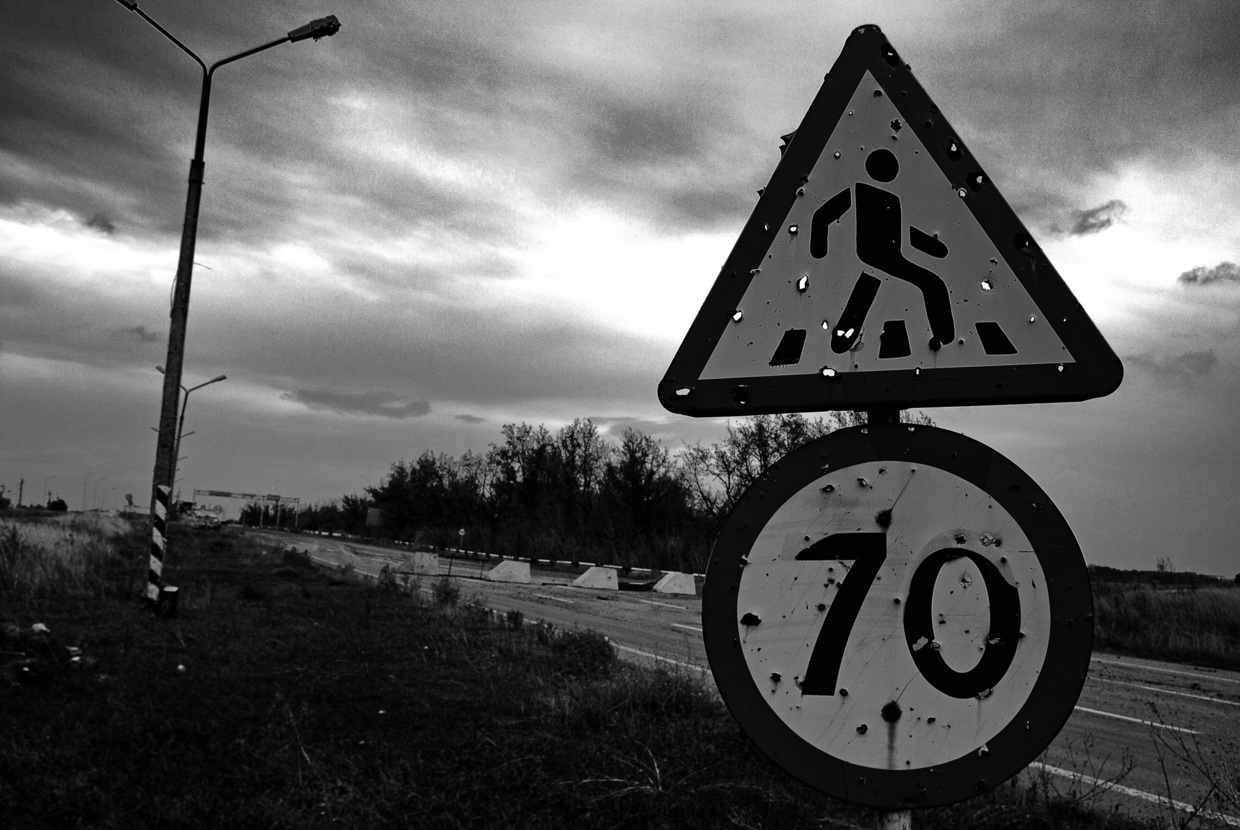
Locals are not the only ones affected by the things happening in the Donbass. Vladimir Grubnik is an M.D., and in his previous life he was a surgeon and professor at the Odessa Medical University. In 2015, he was detained by the Ukrainian Security Service and charged with sabotage activities. He spent over four years in jail and got out in 2019 during a prisoner exchange between the DPR/LPR and Ukraine.
Before the war, Vladimir had visited the Donbass only once – he went to a surgery conference in the resort town of Svyatogorsk. The cruel irony is that the retreat center hosting the event was later turned into a concentration camp by the Security Service of Ukraine. It was where they brought political prisoners scheduled for an exchange. This facility was originally built so people could come here to get better, and now it was cordoned off by checkpoints, sniper positions, and patrol units. Vladimir experienced the retreat center in both capacities. “It was somewhat ironic that ten years later I ended up in the same place but under completely different circumstances,” he says.
When asked about Donetsk and whether or not it had become his second home, he quoted the lyrics of a famous 1970s Russian song: “My address is not some street or building; the Soviet Union is my address. I was born in the USSR, I am a Soviet patriot, it is my country, my big homeland. Odessa, Donetsk, Moscow, Kiev – I don’t draw a distinction between these cities, they all are important, and I feel personally responsible for their freedom. I have to fight for their liberation. That’s why I can call Donetsk my second home and say that the Donbass is the region in Novorossiya [historically part of southern Russia, and now most of it is in Ukraine – RT] that managed to succeed. They were able to do, albeit only in part, what we couldn’t. This ‘in part’ is something we can talk about.”
Vladimir doesn’t support everything happening in the Donbass; he mentions that when the changes started in 2014, people were hoping for a completely different scenario. They wanted to be reunited with Russia, much like Crimea did. But Ukraine utilized Nazi militants and started a war, which then led to the Minsk agreements that now affect every aspect of life here. Nobody in the Donbass, especially the officials, can go against the Minsk II vector, because it was sanctioned by Russia’s establishment.
“Some public servants are ready to give the shirt on their back, to do everything in their power to make sure that their people don’t lack anything. This is very inspiring and deeply touching. And there are others – opportunists who serve under the republics’ flags today but will easily switch sides tomorrow. The Minsk agreements limit the extent of what the people from the first group can do, while the trimmers could enjoy total freedom in their lack of integrity – they don’t have any ideological filter that would help them tell the difference between good and evil. Everybody sets their own standards,” he explains.
The Minsk agreements force the supporters of Novorossiya to formally recognize the Donbass republics as Ukrainian territories. Vladimir believes that such hybrid policies cause schizophrenia-like reactions, as the uncertainty, duplicity, and ambiguity demoralize people – they don’t know what their future will look like and doubt the fact that all their efforts will pan out. They are afraid that instead of reuniting with Russia they will have to compromise and agree to a special status for the Donbass while remaining part of Ukraine. Like tens of thousands of others who have been part of the Russian Spring since 2014, Vladimir describes his position as “zero tolerance towards the Nazi Ukrainian [he insisted on using this particular term – RT] state.”
“Things are simpler for me personally – thank you for liberating us, we will take it from here. After getting a life sentence I am just happy to be free – this is already beyond my expectations,” Vladimir says.
He recently spoke with Charlotta Relander, the OSCE’s coordinator of the Trilateral Contact Group’s humanitarian working subgroup on the Donbass. Vladimir has no illusions regarding the OSCE’s interest in hearing an ex-POW’s point of view. He says that it is a politically biased organization, and its actions only confirm his belief. Last fall, the OSCE stood idly by and watched as the Ukrainian special forces kidnapped Andrey Kosyak, who had immunity as a member of the JCCC in the LPR (the Joint Centre for Control and Coordination on ceasefire and stabilization of the demarcation line). Vladimir believes that the organization completely discredited itself and should not operate in the Donbass: “This is basically legitimized espionage, they are working for the enemy – they have been this whole time.”
“For me, this war started in 2014 and is still going on. We use different methods, but it doesn’t mean that something has changed. Not everyone will agree with me, but I think we’ve been at war this whole time. The Nazi Ukrainian state is ready to escalate things – it’s a fact. Therefore, we have to be ready as well, so we can react accordingly. Sadly, the republics are in a miserable state right now, and the People’s Militia are even in a worse situation. They will not be able to stand against a full-scale Ukrainian offensive on their own,” he says.
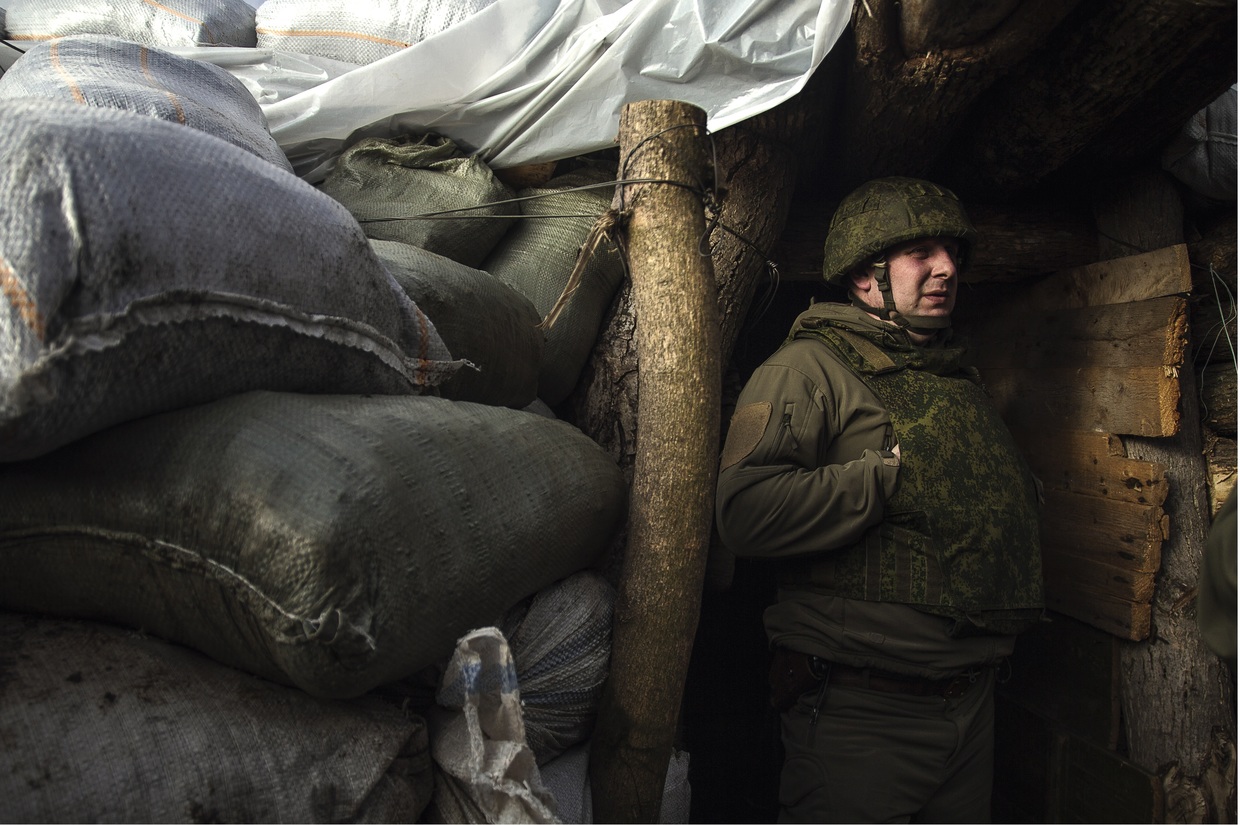
“Therefore, the question of the Russian Army coming to help is especially acute, as well as the accompanying questions, such as when and how this help will come. Can the troops move in as soon as the action starts or only several days after, when there will be no one to save here anymore? It’s no longer enough to just believe or hope. One has to understand one’s chances clearly, taking into account all sorts of factors, including the global politics and the room for maneuver that the Russian government will/might have. One has to consider, under what circumstances Russia will not only be compelled to launch a military campaign in the Donbass but also run full-scale operations along the entire Russian-Ukrainian border. How fast will the decision on the subject of intervention be made? Will it be a conventional or ‘hybrid’ warfare? Much will depend on the specific answers to these questions. The times of covert ops masked by the official narrative denying Russia’s military presence on the ground are over. Now it is time to consider every single factor because they will decide the outcome. The devil is in the details,” says Vladimir.
Before we say goodbye, Vladimir tells us about the difference between living in the DPR’s central areas and on the outskirts, close to the front line. “There is a huge difference between living in a time of war and living on the battlefield. Sometimes, you move a dozen miles away from the front line and you can completely forget about the war. People who live in safe areas tend to stop really caring about the fate of those less fortunate. While some are biting the dust, others, to quote Vladimir Mayakovsky’s famous poem ‘To You,’ ‘with their mouths full of meat and fat, are lasciviously crooning Severyanin’s poems.’ That’s the reality we live in today,” he concludes.
Truth be told, however, even those living in safer areas still feel strange – maybe they are not on the battlefield, but definitely in some kind of limbo. They can’t shake off this feeling of “between-ness.” Some compare it to living on the frontier. It’s like being on the brutal “Russian field of experiments,” which is a concept introduced by the Russian rock musician and conceptual artist Yegor Letov. People live in a liminal state. They often can’t describe what it is exactly, but they all are participating in what’s going on, making their contribution.
Underground Stage is a rock bar in Donetsk, the main venue for local performers. Very few musicians bring their gigs to the conflict zone. Many are scared of the unstable situation, others don’t want to be banned in Ukraine. There are also those who think that performing in the Donbass will mar their reputation, and some simply don’t understand how they benefit financially from playing their music in a region devastated by a humanitarian crisis. The only musicians who come here are those who want to make a political statement, such as rock stars Yulia Chicherina and Vadim Samoylov, or rappers Rem Digga and Husky. When they’re not in town, live music is supplied by local bands.
The isolation Donbass found itself in encouraged local artists: There always must be someone to sing songs, write poems, and talk to people from the stage. When the stage is left empty and all ‘mainland’ stars are only available in the form of digital tracks, someone on the ground is bound to step in and fill the void. That’s how the Donbass’s own rock group Height 277 was born, known for its track ‘The Voice of Small Towns.’ Those who didn’t write their own music went on to produce a lot of cover versions of popular songs from 2007 reminiscing about the good old times when they were young. There are a lot of local cover bands in the Donbass. While the rest of the world discovered what it was like to have all shows canceled only in 2020 with the advent of the coronavirus pandemic, the Donbass had been dealing with isolation for six years.
The Donbass has found a way to deal with it. One day, the local crowd comes to sing along to the cover of ‘Kukushka,’ a song written by popular Russian rock star Viktor Tsoi, who died two decades ago in a motorbike crash. ‘Kukushka’ (‘cuckoo bird’ in Russian) has become a favorite wartime song in the Donbass. And the next night, people slamdance to the sounds of the American nu metal band Korn, performed by local guys. The lead singer intentionally sings and talks in English, trying to provide the audience with an authentic experience so that for one hour the fans could feel like they are watching Korn perform live for them. This couldn’t be real of course, because Korn would never end up on stage in the Donbass for all sorts of reasons: because the world is on lockdown due to the Covid-19 pandemic, because there is a war going on in the Donbass, and because Korn is already history, and that history didn’t include Covid-19 or the Donbass war. But if young people here want to listen to Korn, they will listen to Korn. They create their own reality to the best of their ability.
The same can be said about other arts in the Donbass, including cinematography. Anton Gorokhov is 28. Eight years ago, he came here as a volunteer and soon was in charge of a group of drone pilots. As time went by, he realized that life was bigger than action on the battlefield. Today, Anton is shooting movies about people. Among other things, he produced the Donbass’ first film about war, ‘Opolchenochka’ (Russian for ‘militia girl’).
“There is definitely demand for arts and films that educate and tell the story of what’s going on. ‘Opolchenochka’ tells the story of a tank crew that consists entirely of women who for various reasons ended up in the Donbass fighting a war. We showed the film in Russia as well as in the DPR/LPR, and everywhere, people asked to be able to see more stories about the Donbass and its people. People ask us to keep making movies about their experiences here,” says Anton.
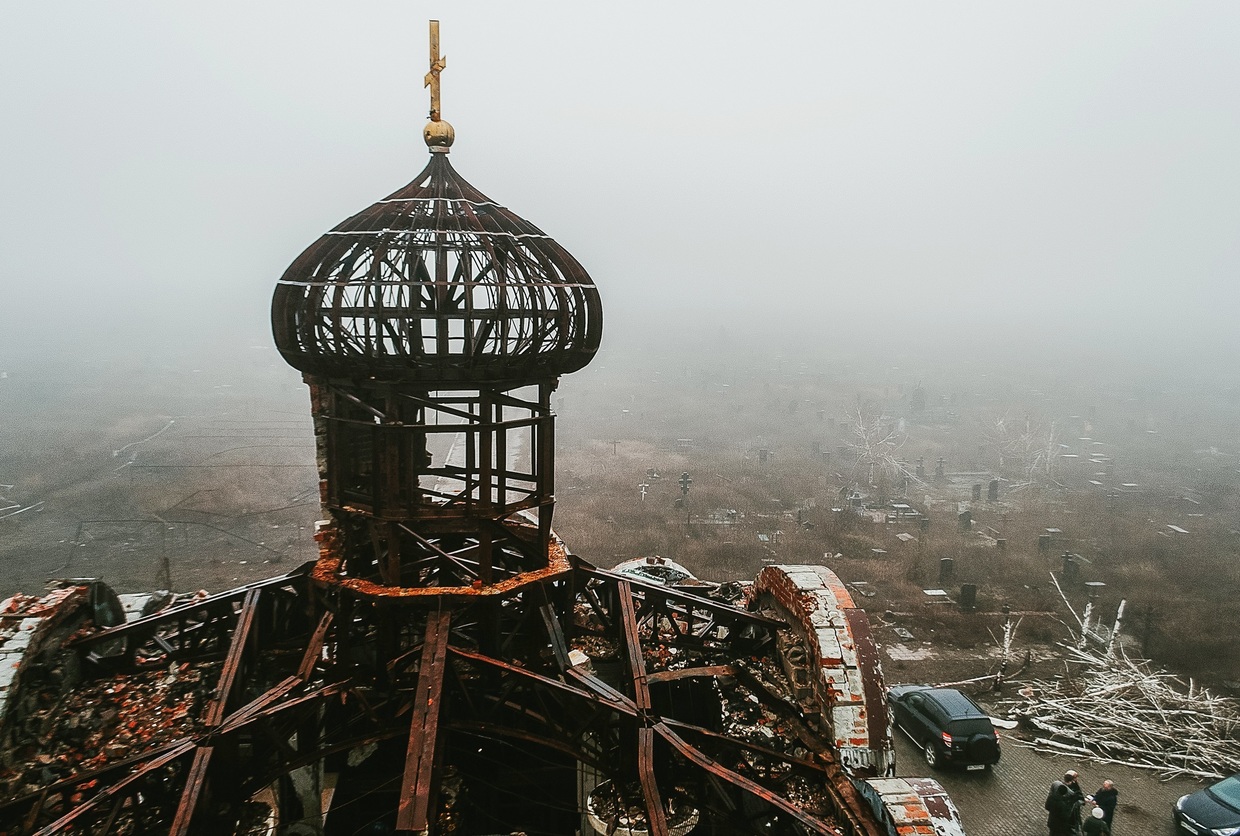
Anton soon became deputy head of the Union of Donbass Cinematographers after the non-profit organization was registered in the LPR. Right now, the Union has big plans discussing joint projects with Russian filmmakers. The Union represents Lugansk’s People’s Cinema Studios and Lugafilm studios, as well as Shakhtersk-based Donfilm studios, which produced the philosophical film ‘Zamysel’ (Russian for ‘conception’). The cinematographers of the Donbass want to spearhead development of the industry, and they do have a rich source of war-related stories to tap into. In this regard, they beat any Russian or post-Soviet cinema studios to the chase. The Union of Donbass Cinematographers is planning to run two film festivals in Donetsk and Lugansk in February and March this year.
“Will an escalation change our plans? No, it won’t. We’ve been working for eight years now here, in the war-stricken breakaway republics, and we’ve dealt with many escalations. Even if a full-scale war breaks out we will respond by making more movies. We will sleep less and work more. But of course, I can’t wait for Russia to finally take the plunge and claim its southern territories. In any case, I will keep doing what I’m doing, i.e. my military duty and making films, telling the stories.”
Anton also runs another project, the Young Diplomatic Corps of the Unrecognized States. It aims to encourage and facilitate contacts between the young people of Russia and the Donbass, as well as to promote acceptance of sovereignty of the Donbass breakaway republics by civil society. Anton believes it’s of critical importance to provide the platform to those who live in the unrecognized republics so they can voice their disagreements with the international community. He believes that “neither the UN nor any other international organization are capable of dealing with the challenges facing them, which is why we propose looking for new ways to build a new balanced world order.”
Among the young people Anton is trying to give the platform to are 24-year-old Alexander and his 25-year-old girlfriend Irina. Both have bachelor's degrees in history from Donetsk National University. Irina is now working on her MA degree at her alma mater, while Alexander decided to get his from the St. Petersburg State University. Due to the pandemic, however, he is still in Donetsk, completing his course of studies remotely.
Although the young people have Russian passports, Irina doesn’t feel like she is a citizen of Russia. She would welcome an escalation in the Donbass. “War takes people’s lives, which is a very bad thing, but at the same time it gives us hope that the Ukrainian issue will be finally resolved,” she says. “In the long-term perspective, a full-scale war is less dangerous than a low-intensity conflict lasting for decades.”
Irina is aware that a political settlement always implies bargaining. She believes that bargaining is justified if the conflicting parties have something in common and can offer things to each other. “We are focused on global players, projecting the situation onto Russia and the US, which have a lot to offer each other,” she says. “A political settlement is justified in this case. But here, in a smaller arena, other kinds of players are involved – the Russians of the Donbass and the Ukrainian government. There can be no bargaining in our case.”
“We have disagreements over the agrarian issue,” Irina quotes a famous phrase by a Russian Civil War general. “They want to bury us in this land and we don’t want them to walk on our land. It’s just that this land is ours. I was born and raised here. This means that the only possible scenario is war. Besides, we know from history that there have been no examples of a conflict being successfully resolved through a peaceful settlement, it’s always just mediation. And this policy is only effective temporarily, until it all explodes once again.”
“I will pray for Novorossiya,” Irina jokes in response to the question of what she is going to do in case of an escalation. “Speaking in earnest, everything depends on how the military campaign goes. I will have to postpone my plans of moving to St. Petersburg indefinitely. With my current professional training, I will do what I can to help the civilians. The situation is aggravated by the fact that someone near and dear to me lives in Kharkov. So, if you want me to be completely frank, I am prepared to take even more radical actions if I need to.”
Alexander, on the contrary, identifies as a Russian citizen. “I am concerned about the current escalation of the conflict, but I’ve pinned my hopes on military and political assistance from Russia. As a Russian national, I want to be sure that the question of recognizing the DPR/LPR as independent states will be positively resolved in February.”
Alexander believes that a political settlement within the framework of the Minsk agreements in their current form will be the worst outcome. He describes himself as “a vehement opponent of the Donbass’ reintegration into Ukraine.” The only political settlement scenario he deems acceptable is for the DPR/LPR to be recognized as independent by Russia and subsequently be integrated into Russia. Otherwise, the only option is to get back to the frozen conflict stage.
At present, Alexander is in his final year at a Russian university. He is studying online and, irrespective of how the situation plays out, he is going to move to St. Petersburg and enroll in a post-graduate program. He does not see a future for himself in the Donbass. “Even if the DPR/LPR come under Russia’s jurisdiction, it will take decades to bring the quality of local political and economic management to the average level of the Russian regions. We can see this in Crimea,” he says.
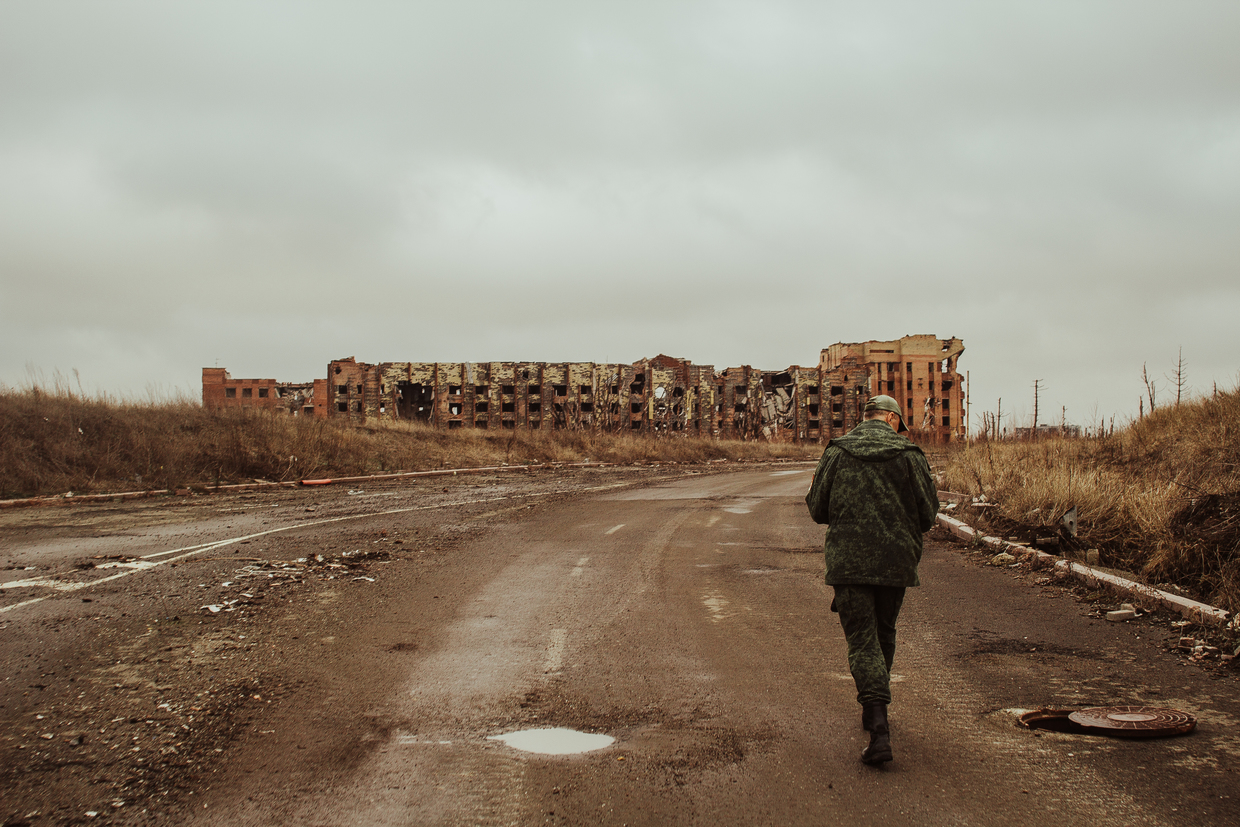
Vladimir is not happy with the current political and economic management of the Donbass, either. For several years now, the 24 year-old has been providing humanitarian support to the locals who suffer from the ongoing military conflict.
“There is a house somewhere in Yasinovataya or the Kievsky district of Donetsk, owned by an old woman,” he recounts. “In 2016, or maybe 2017, her house was hit by artillery fire and the windows were broken. If she has any relatives and they are normal, sensible people, they will probably fix a window for her, even if not at once. But if there is no one to help, she will have to cover the holes with whatever comes to hand or some material she gets from her neighbors. She does not have money to buy new windows. So she will be living in a dark and damp house all this time – this dampness will get in through small cracks and gaps around the covered windows, resulting in black mold all over the walls and the ceiling of the house. It will kill her, eventually.”
Vladimir’s job is to help his fellow citizens who got in a similar situation. He is surprised that in the five years of relative calm on the front line, the DPR’s government has done absolutely nothing to remedy the consequences of combat activity. No emergency measures were implemented to help the people living close to the front line move further inland, or to support internally displaced people (IDPs) from the towns seized by Ukraine who had to take shelter in overcrowded recreation facilities or dilapidated dormitories.
“It takes time to replace a window. First, they take the measurements and then you have to wait for the window to be made. If we’re talking about just one window, everything will be done more or less fast, but a bulk order, for several families, takes more time to process, coordination takes time. We have had several cases when the customer did not live to receive the promised support. Sometimes, when we finally arrive at an old woman’s house to install a window, it is already too late. She has died, they tell us. It happened on several occasions. Once we were even treated with pastries at a funeral repast.”
Vladimir does not attach much importance to the present-day escalation, nor does he believe the status of the Donbass republics is going to change. He thinks that any offensive, limited to the Donbass – no matter if it comes from Ukraine, or the Donbass republics, or the Russians – will only bring more destruction and take more human lives. “This is an urbanized area, where both conflicting sides spent eight years in the trenches. Debaltsevo was destroyed and, after seven years, it is still in ruins. Why lose more lives, tens of thousands of lives? If Ukraine wins, it will have to address the Crimean issue and the need to restore the Donbass region it has destroyed with its own hands. If the republics get the upper hand, the war will continue, but the frontline will be moved to Mariupol and Slavyansk, instead of Gorlovka and Donetsk,” he says.
“Only the Russian peacekeepers can bring this war to a close by launching a massive attack against the rear parts of the Ukrainian armed forces. This is what can help end the war in Donetsk and Gorlovka, in Mariupol and Slavyansk, and in Kharkov, in Odessa, in Kiev. And this is when Crimea will finally get enough fresh water. [Ukraine has blocked almost 90% of the water supplies flowing into Crimea, after the republic joined Russia – RT.] And I will be able to finally ask this bunch of scum, our public officials – where is the money that was supposed to stop civilian losses? Where has it all gone, I will ask them, and I don’t care if this will make them think that I’m siding with Ukraine.”
These people, who fell victim to a geopolitical conflict, do not fool themselves. They do not insist that the path they have chosen is perfect and beyond reproach. The rasputitsa that we witnessed in September 2014 when the first Minsk Protocol was signed, then again in February 2015 with Minsk II, has diverted the Donbass and the rest of Novorossiya from their path of rejoining Russia. Dirty politics has almost succeeded in confusing millions of people, in persuading them that everything they have gone through – fighting, hardships, friends and family members killed in the war, all the defeats and victories – everything was done for the sake of something entirely different.
However, every nation has a special legend they turn to in times of hardships. The Russians of the Donbass are no exception. They go on living in their native land, hoping that this period of rasputitsa triggered by hybrid politics will be over one day, and all the foul and mean things that are happening now will freeze along with the mud of the steppes. And then these people, living in the constant fear that tomorrow may never come for them, will finally get a chance to liberate their towns and themselves. Are they afraid of the “Russian invasion”? No, they are hoping for one. And they call it “humanitarian intervention.”
The statements, views and opinions expressed in this report are solely those of the author and do not necessarily represent those of RT.
